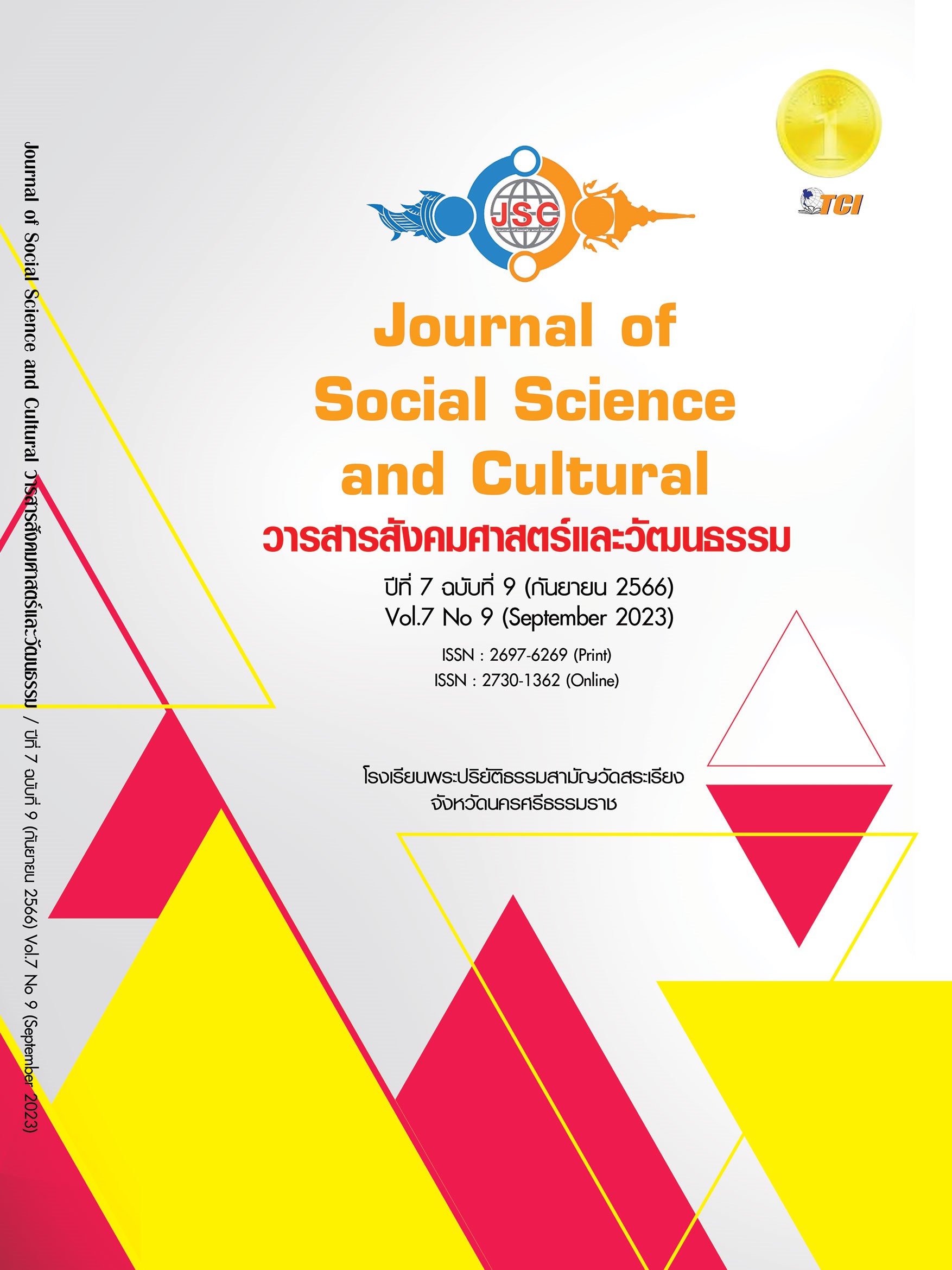THE DEVELOPMENT OF SYSTEMATIC KNOWLEDGE TO SUPPORT AREA-BASED EDUCATION MANAGEMENT SOUTHERN BORDER PROVINCES
Main Article Content
Abstract
This research aims to develop systematic knowledge to support spatial education management. Southern border provinces There are research methods: 1) in-depth interviews and meetings to study the local context in real situations from School administrators, teachers, and school committees The results of the research found that all 3 schools had good practices. Project-based learning management Proactive learning management Organizing learning using the brain as a base. 2) Analyzing the data and organizing the elements to create a set of knowledge manuals. It was found that in the information system aspect Participation of the provincial area When considering each aspect, it was found that the Sufficiency Economy Philosophy aspect had a weight of (.906), followed by the aspect of providing education for all (.845) and the aspect of participation of all sectors (.141), which had a low weight. Ultimately, there are 10 elements: 1) Pride and loyalty to the nation, religion, and monarchy 2) Developing learners in the 21st century 3) Living together in a multicultural society 4) Development of learning media 5) Reduce educational inequality 6) Access Quality education, 7) environmentally friendly quality of life, 8) education management system, 9) building morale and encouragement, and 10) integrating education with agencies at all levels, and 3) presenting systematic knowledge. Support the organization of spatial studies by using questionnaires to test in educational institutions that are not a sample of 90 people using purposive sampling methods. Data were collected using a questionnaire. to find that cooperation network Develop innovations in supporting budgets and resources for educational reform. Knowledge has an indirect effect (Indirect effect) through the knowledge system component. Knowledge has an indirect effect. through the inequality component Knowledge has an indirect effect through and management of special areas.
Article Details
References
กระทรวงศึกษาธิการ. (2542). พระราชบัญญัติการศึกษาแห่งชาติ พ.ศ.2542. กรุงเทพมหานคร: โรงพิมพ์คุรุสภาลาดพร้าว.
ฐิติยา เรือนนะการ และพิศมัย ศรีอำไพ. (2559). “การจัดการเรียนรู้ภาษาอังกฤษในโรงเรียนมาตรฐานสากล”. วารสารวิชาการศึกษาศาสตร์ มหาวิทยาลัยศรีนครินทรวิโรฒ, 17(2), 40-53.
ทิฆัมพร สมพงษ์ และคณะ. (2562). “การบริหารสถานศึกษาในสังคมพหุวัฒนธรรมในสามจังหวัดชายแดนภาคใต้. วารสารหาดใหญ่วิชาการ, 14(1), 98-107.
พระมหามงคลกานต์ ฐิตธมฺโม และคณะ. (2562). “การอยู่ร่วมกันของคนในสังคมพหุวัฒนธรรมในประเทศไทย กรณีศึกษาสังคมพหุวัฒนธรรมในอำเภอเมือง จังหวัดเชียงใหม่,”. วารสารมหาจุฬาวิชาการ, 6(2), 46-59.
พิภพ บุญธรรม. (2561). “การบริหารจัดการเพื่อส่งเสริมการมีส่วนร่วมของประชาชนในการพัฒนาเมืองโบราณอู่ทองขององค์การบริหารการพัฒนาพื้นที่พิเศษเพื่อการท่องเที่ยวอย่างยั่งยืน (องค์การมหาชน),”. วารสารการบริหารปกครอง, 7(2), 474-501.
รัชวดี แสงมหะหมัด. (2560). “ความเหลื่อมล้ำทางการศึกษา : คุณภาพสังคมที่คนไทยมองเห็น,”. วารสารรัฐศาสตร์และรัฐประศาสนศาสตร์, 8(1), 33-66.
รุ่งชัชดาพร เวหะชาติ และวีนัส ศรีศักดา. (2564). องค์ความรู้เชิงระบบสนับสนุนการจัดการศึกษาเชิงพื้นที่ เพื่อลดความเหลื่อมล้ำและสร้างความเสมอภาคของสังคมอย่างยั่งยืน พื้นที่เขตพิเศษเฉพาะกิจ 3 จังหวัดชายแดนภาคใต้. ใน รายงานการวิจัยฉบับสมบูรณ์. มหาวิทยาลัยทักษิณ.
สํานักงานเลขาธิการสภาการศึกษา. (2560). แผนการศึกษาแห่งชาติ พ.ศ. 2560-2579. กรุงเทพมหานคร: บริษัทพริกหวานกราฟฟิค จํากัด.
สำนักงานเลขาธิการสภาผู้แทนราษฎร. (2562). พื้นที่นวัตกรรมการศึกษา (Education Sandbox) เอกสารวิชาการอิเล็กทรอนิกส์ สำนักวิชาการ กลุ่มงานบริการวิชาการ 3 สำนักวิชาการ สำนักงานเลขาธิการสภาผู้แทนราษฎร. เรียกใช้เมื่อ 20 ธันวาคม 2565 จาก https://www.parliament.go.th/library.
สิทธิชัย ทองมาก และคณะ. (2561). “เหลียวหลังแลหน้าคุณภาพการศึกษาในสามจังหวัดชายแดนภาคใต้”. วารสารมหาวิทยาลัยสงขลานครินทร์ สาขามนุษยศาสตร์และสังคมศาสตร์, 5(ฉบับพิเศษ), 186-198.


